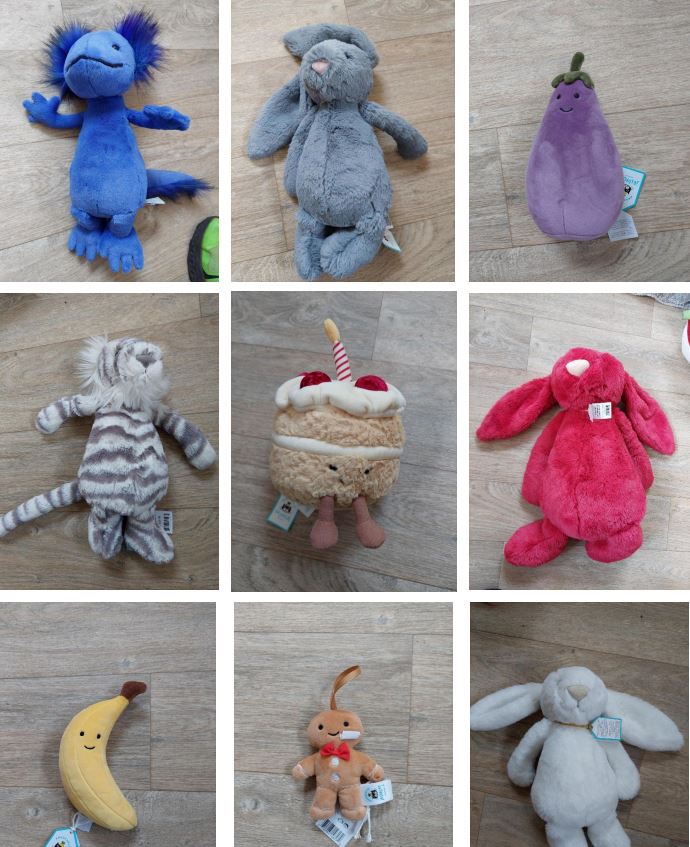
Fluffy, colourful and cute — Jellycats have become the latest collectable to go viral with their popularity rivalling the Beanie Baby craze of the 90s.
The Prince and Princess of Wales were even gifted two of the toys plushies during a royal garden party at Buckingham Palace last month, with William saying: “These are like gold dust, my children go crazy for these things.”
But the fame and expensive price tag of the toys means they have also become a target for thieves, including organised criminal gangs.
Independent garden centres and bookshops up and down the country are facing incidents of shoplifting that has left retailers thousands of pounds out of pocket.
The stolen items, traders have told The Independent, end up on dedicated Facebook pages for buying and selling of the toys, as well as listings on online marketplaces like eBay and Vinted.

Prices range from £12 for a smaller toy up to £200 for a giant one.
Just last week, Dorset Police issued an appeal after a woman entered a bookshop in Christchurch twice, stealing almost £250 worth of Jellycat toys.
On Friday, West Mercia Police arrested a 38-year-old woman after Jellycat toys were stolen over three incidents at St Peter’s Garden Centre and Evesham Country Park, both in Norton, Worcestershire.
And in February, a woman admitted stealing almost £3,000 worth of Jellycat toys from three different garden centres in Norfolk. Ruby Smith, 35, of Eye in Suffolk, was sentenced to a 26-week prison sentence, suspended for 24 months.

In March, the Gorge Bear Company suffered an overnight ram raid at its store in Cheddar, Somerset, when around 300 of the toys were allegedly stolen. A man has been arrested by police while inquiries continue.
And in Bridport in Dorset last year, Charlie Groves, owner of Groves Nursery, spotted on on CCTV a woman pushing a baby in a pram while allegedly stealing eight Jellycats worth more than £300.
A woman in her 30s has been charged with shoplifting in connection with the incident. She is due to appear at Newton Abbot Magistrates’ Court for a plea hearing on 14 August.
Mr Groves said: “The Jellycat toys are collectable, and it’s just another sought-after good criminals appear to turning to, while independent retailers like ourselves lose out. There’s a clear cost to all this.
“We think the toys are stolen and then sold online, it’s very difficult to stop, but we’ve tried to up our security in store.”
The success story behind the Jellycat toy started in 1999 when brothers Tom and Will Gatacre founded the brand and displayed their products at a London trade show, attracting the attention of major retailers such as John Lewis and Selfridges.
Today, the company has around 1,200 stockists across the UK, although has reduced the number recently to “offer the best shopping experience for customers”.

Katy Bourne, the national lead on retail crime for the Association of Police and Crime Commissioners (APCC), told The Independent she was also aware of a “high number of cases” involving Jellycats.
She is encouraging targeted shops like garden centres to provide details on thefts to an information-sharing schemed used by police forces called Project Pegasus, which she launched in 2023.
She said: “The Jellycat toys are so resaleable, so sought after and valuable — we are seeing some people stealing them in bulk.
“They are so resaleable because people want to buy them for their kids. It is a mix of people stealing. We have seen organised criminal gangs, but you also get the opportunists. Shops need to work with police on stopping the thieves.”
In April, figures released by the Office for National Statistics (ONS) showed the number of shoplifting offences had reached a record high. A total of 516,971 offences were logged by forces in 2024, up 20 per cent from 429,873 in 2023.
Nearly a quarter of people have witnessed shoplifting taking place in a shop over the past 12 months, said the British Retail Consortium, which estimated the crime costs retailers in the UK £2.2bn last year.
The body said it suspected Jellycat toys were being stolen to relate online due to their high value.
Speaking about retail crime generally, Graham Wynn, assistant director of business and regulation, told The Independent: "While the causes are manifold, the rise in organised crime is a significant concern, with gangs hitting stores one after another.
“Sadly, such theft is not a victimless crime; it pushes up the cost for honest shoppers and damages the customer experience."






